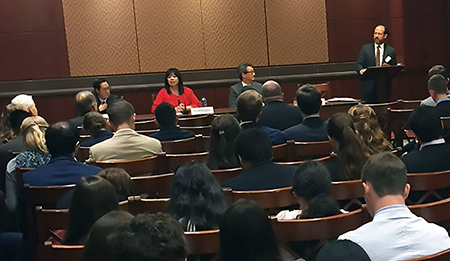"I find hope in the work of long-established groups such as the Arms Control Association...[and] I find hope in younger anti-nuclear activists and the movement around the world to formally ban the bomb."
Events and Remarks
 Staff and experts with the Arms Control Association periodically host or participate in events to inform policymakers, journalists, and the public about important developments in arms control.
Staff and experts with the Arms Control Association periodically host or participate in events to inform policymakers, journalists, and the public about important developments in arms control.
If you have any questions about our events or wish to secure a speaker, contact Tony Fleming, Director for Communications, at (202) 463-8270 ext. 110.
Below find remarks by Arms Control Association staff, board members, and experts at recent events.
Fifty years since the crisis of October 1962 brought the world to brink of nuclear war, the threats posed by the bomb have changed, but still hang over us all. There still are nearly 20,000 nuclear weapons and there are nine nuclear-armed states. More countries have access to the technologies needed to produce nuclear bomb material; the risk of nuclear terrorism is real. The United States and Russia still deploy more nuclear weapons than necessary to deter nuclear attack.
Nearly all of the world’s nations recognize that nuclear explosive testing is no longer acceptable...
Remarks by Daryl Kimball to the Conference on Chemical Weapons, Armed Conflict and Humanitarian Law at Queens University, Kingston, Ontario on October 29, 2018
The Arms Control Association hosted a discussion with Herb Lin about the major themes and recommendations in his new book Cyber Threats and Nuclear Weapons published in October 2021.
Transcript of the third panel at "Next Steps in Arms Control," a conference hosted by the Heinrich Böll Foundation and the Arms Control Association. Speakers include Greg Thielmann, Eric Desautels, Jiri Sedivy, and Tom Z. Collina.
With the sequester now a reality, the Defense budget must come down. One place to look for savings is the $31 billion the United States spends each year on nuclear weapons. The Pentagon had been seeking to build a new generation of multi-billion-dollar nuclear delivery systems, including long-range missiles, submarines and bombers, as well as extending the service lives of nuclear warheads. Now, those plans are in doubt.
The nuclear Nonproliferation Treaty (NPT) was indefinitely extended in 1995. The Comprehensive Test Ban Treaty (CTBT) was negotiated in 1996. Two decades later...
Remarks by Greg Thielmann for the Polis 180 Fireside Chat: Powerless Europe? The Future of Nuclear Weapons Policy in Europe, Berlin, Germany
Moderator - ACA Executive Director Daryl Kimball Speakers- Sidney Drell, Ambassador James Goodby, and Ambassador Tibor Tóth
Transcript available. The Arms Control Association on Thursday, Jan. 20, 2011 hosted the second in a series of briefings on Solving the Iranian Nuclear Puzzle with panelists Barry Blechman, Charles Ferguson, Greg Thielmann and moderated by ACA's Executive Director Daryl G. Kimball. The panel examined what a viable diplomatic solution with Iran would look like and ways to achieve it.
Four years ago, President Barack Obama outlined an action plan to reduce nuclear weapons-related risks. Significant progress has been achieved but momentum has slowed, proliferation problems in North Korea and Iran persist, and the slow-moving arms race in South Asia continues.
The Arms Control Association 2016 Annual Meeting will take place on June 6, 2016 at the Carnegie Endowment for International Peace in Washington, D.C.
Speaker Luncheon - "Advancing U.S. Nonproliferation and Disarmament Leadership" with Gary Samore, Special Assistant to President Obama and White House Coordinator for Arms Control and Weapons of Mass Destruction and Terrorism
Transcript Available. After four rounds of UN sanctions and on-going discussion of introducing additional measures by the United States and its allies, the effectiveness of sanctions in constraining Iran's nuclear program has come under increased international scrutiny. With an Iranian regime accustomed to withstanding deprivations in the past and increasing political turmoil in the Middle East, measuring the impact of sanctions on the Iranian decision-making process remains a difficult challenge.
Concluded by Presidents John F. Kennedy and Nikita Khrushchev only months after the Cuban Missile Crisis, the Limited Test Ban Treaty (LTBT) was an historic first step toward reining in the U.S.-Soviet nuclear arms race. The LTBT, which banned nuclear test explosions above ground, underwater, and in space, led to the end of the most visible and strongly opposed aspects of the arms race: hundreds of open-air explosions that spewed dangerous levels of radioactive contamination far beyond the test sites of the nuclear powers. Fifty years ago, the Senate debated and approved ratification of the LTBT.
Kelsey Davenport, director of nonproliferation policy, at the 2016 Timbie Forum on engaging emerging professionals in the field
Corey Hinderstein (NTI), Lt. Gen. (ret) Frank Klotz, and ACA's Kingston Reif assessed on the Trump administration’s policies on nuclear weapons spending, U.S.-Russian nuclear arms control, and the 2015 Iran nuclear deal and nuclear diplomacy with North Korea—and offered recommendations for a more responsible and effective approach.
